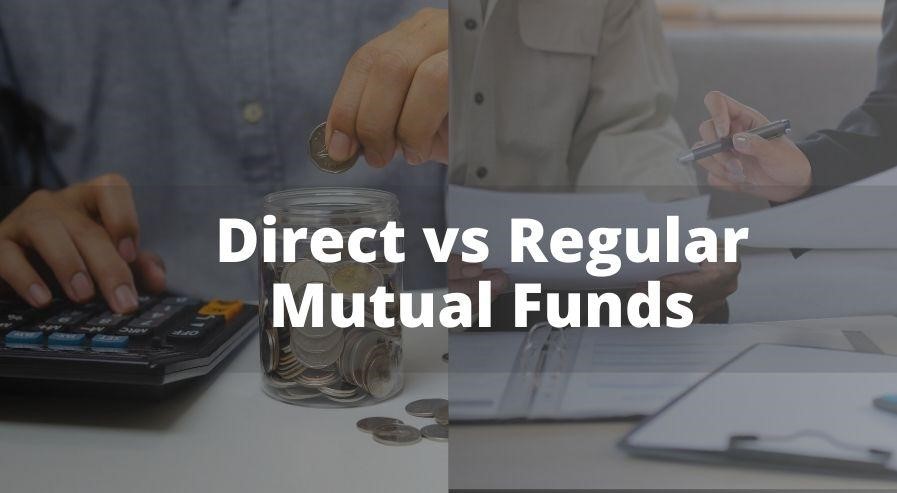Table of Contents
What Are Regular Mutual Funds?
What Are Direct Mutual Funds?
Direct vs. Regular Mutual Funds – Which One is Right for You?
Benefits of Investing Through a Mutual Fund Distributor
But The Higher Fees, Conflict of Interest?
Conclusion
Investing in mutual funds has gained immense popularity in recent years. You can either invest directly in a mutual fund of your choice (direct funds) or seek guidance from a mutual fund distributor/advisor and invest through them (regular funds).
Direct funds come with lower expense ratios, while regular funds offer professional support to help you make informed decisions. However, cost isn’t the only factor that sets them apart.
This blog breaks down the key differences between direct and regular mutual funds, their pros and cons, and how a mutual fund distributor can add value to your investment journey—helping you choose the option that best fits your needs.
What Are Regular Mutual Funds?

Regular mutual funds are investment schemes where investors invest through an intermediary, such as a mutual fund distributor, broker, or financial advisor. These intermediaries assist investors in selecting funds based on their financial goals and risk tolerance, while also handling essential tasks like KYC verification and form submissions, ensuring a seamless investment process.
In return for their services, Asset Management Companies (AMCs) pay them a commission, which is included in the fund’s expense ratio. This makes the expense ratio of regular plans higher than that of direct plans, with commissions typically ranging from 0.5% to 1% of the scheme’s AUM.
Advantages of Investing Through a Distributor
- Professional Guidance: Distributors provide expertise in market trends, asset allocation, and fund performance, helping investors make informed decisions.
- Hassle-Free Investment Process: They handle KYC documentation, form submissions, and other administrative tasks, saving investors time and effort.
- Limitations of Investing Through a Distributor
- Higher Costs: Distributor commissions are factored into the expense ratio, making these funds relatively more expensive.
- Possible Conflict of Interest: Some distributors may recommend funds that offer higher commissions rather than those best suited for an investor’s needs.
What Are Direct Mutual Funds?

Direct mutual funds are investment schemes that investors can purchase directly from an Asset Management Company (AMC) without involving intermediaries.
These funds can be bought online through the AMC’s website, offline by visiting their office, with the assistance of a SEBI-registered Investment Advisor (RIA) or through Registered online investment platforms.
Since there is no distributor commission involved, direct mutual funds have a lower expense ratio, making them a cost-effective option for investors.
Advantages of Direct Funds
- Lower Expense Ratio: Since no commission is paid to intermediaries, direct funds have a lower cost structure, which can improve long-term returns.
- Full Control Over Investments: Investors have the freedom to select funds, execute transactions, and monitor their portfolios without external influence.
- Flexibility to Switch Funds: Direct investors can easily rebalance or adjust their portfolios based on changing financial goals and market conditions.
Limitations of Direct Funds
- Requires Market Knowledge: Selecting and managing mutual funds effectively demands a solid understanding of investment strategies, risk factors, and market trends.
- Time-Intensive Portfolio Management: Investors must actively monitor and review their holdings, which can be challenging for those with busy schedules.
Direct vs. Regular Mutual Funds – Which One is Right for You?

With the rise of financial influencers on social media, many believe that investing in mutual funds is simple and that distributors are unnecessary.
But is investing really that easy? While direct investing has its perks, it demands a good understanding of finance and market trends.
Direct Investment is Ideal If You:
✔ Have a keen interest in finance and regularly track market trends.
✔ Follow global events and understand their impact on stock markets and mutual funds.
✔ Have the time to research, monitor, and adjust your investments periodically to align with your financial goals.
✔ Can analyze different AMCs’ fund performances and have a picture of future trends based on portfolio holdings.
✔ Stay updated on SEBI and AMFI regulations to ensure compliance.
If you meet these criteria, direct investing can help you save costs while maintaining full control over your portfolio. However, if you lack the time or expertise, a mutual fund distributor can provide valuable guidance. Without professional support, you may face:
Risk of Choosing Unsuitable Funds
Selecting mutual funds goes beyond past returns. It requires evaluating portfolio composition, risk levels, and expense ratios to ensure alignment with financial goals. Without expert insights, investors may end up with funds that don’t match their risk appetite or investment strategy.
Ineffective Portfolio Diversification
Many direct investors unknowingly concentrate their holdings in similar types of funds, limiting diversification. A well-balanced portfolio—spanning equity, debt, and hybrid funds—helps manage risk and ensures stability across different market conditions.
Struggles with Market Volatility
Market fluctuations affect mutual fund performance, and emotional decisions can lead investors to hold underperforming funds for too long or exit prematurely. Expert guidance ensures disciplined investing and timely portfolio adjustments to navigate volatility effectively.
Misinformed Decisions
Investing independently requires constant tracking of market trends, regulatory changes, and fund performances. This ongoing effort can be overwhelming, especially for those with busy schedules, increasing the risk of misinformed decisions.
Lack of a Personalized Investment Approach
Every investor has unique financial goals and risk tolerance. While direct investing may reduce costs, it lacks tailored strategies, periodic rebalancing, and professional insights that help optimize funds based on changing financial needs.
Benefits of Investing Through a Mutual Fund Distributor

A professional mutual fund distributor plays a crucial role in simplifying the investment process and ensuring you make informed financial decisions. Here’s how they add value to your investment journey:
Understanding Your Investment Goals
Every investor has unique financial aspirations and varying levels of risk tolerance. A mutual fund distributor helps assess your specific needs, prioritize financial goals, and estimate the required investment amount.
With their guidance, you can choose the right investment options and allocate your money wisely while balancing risk and returns.
Matching Investments to Your Risk Comfort
Understanding your risk tolerance is key before investing. While some investors seek high returns, others prefer a more cautious approach. A mutual fund distributor assesses your risk appetite and helps align your investments accordingly.
This ensures you invest in funds that match your comfort level while also gaining insights into potential performance outcomes.
Strategic Asset Allocation
Once your financial goals and risk tolerance are clear, the next step is to create a well-diversified portfolio. Asset allocation is key to managing risk, and a mutual fund distributor helps you select the right mix of equity, debt, and other asset classes based on your investment objectives.
By spreading your investments across different categories, they help manage risk, improve potential returns, and position your portfolio to better withstand market fluctuations.
Guidance Through Market Volatility
Market fluctuations are inevitable, driven by economic conditions, geopolitical events, and investor sentiment. Many investors make impulsive decisions during market highs and lows, which can disrupt long-term financial plans.
A mutual fund distributor provides rational guidance, helping you stay focused on your financial objectives rather than reacting to short-term market movements.
Ongoing Portfolio Review and Adjustments
Regular portfolio reviews are crucial for maintaining optimal investment performance. Mutual fund distributors help you assess your portfolio’s performance and suggest adjustments as needed.
Whether it’s rebalancing asset allocation or adding/removing funds, they ensure your investments align with your evolving financial needs and risk tolerance.
Keeping You Updated on Regulatory Changes
The mutual fund industry in India is regulated by SEBI, which frequently updates policies to protect investors. Staying informed about these changes is vital to ensure compliance and make informed investment decisions.
A mutual fund distributor ensures you stay updated on regulatory shifts, helping you adapt to new rules and adjust your investments as needed.
By leveraging a mutual fund distributor’s expertise, investors can make informed financial decisions, structure a well-diversified portfolio, and navigate market changes effectively to stay on track toward their long-term financial goals.
But The Higher Fees, Conflict of Interest?

Working with a mutual fund distributor has its advantages, but some investors hesitate due to the drawbacks usually associated with distributors.
Are Distributor Fees Worth It?
One common concern is higher costs. Distributors earn commissions from AMCs, which are included in the expense ratio, making regular funds slightly more expensive than direct plans. However, this cost covers their expertise, guidance, and ongoing portfolio management support.
Think of it like booking a travel agent for an international trip. Sure, you can plan everything yourself—search for flights, compare hotels, and figure out visas and itineraries. But a travel agent knows the best routes, avoids unnecessary costs, and helps you navigate unexpected issues. While they charge a fee, they save you time, effort, and costly mistakes.
Similarly, a mutual fund distributor ensures your investments align with your financial goals while helping you navigate market complexities.
Conflict of Interest?
Another concern is the potential conflict of interest. Some distributors may suggest funds that offer them higher commissions rather than those best suited for you. This is similar to a travel agency promoting only certain hotels because they earn a commission, even if better options exist.
To avoid this, selecting the right mutual fund distributor is crucial. Instead of picking one randomly, investors should evaluate their certifications, experience, and past performance before making a decision.
Selecting the right mutual fund distributor involves two key steps:
Verify Legitimacy – Ensure the distributor is legally authorized to offer mutual fund services. They must have cleared the NISM Series V-A: Mutual Fund Distributors Certification Examination and obtained AMFI certification. This step helps you avoid unqualified distributors and scams.
Check for Conflict of Interest – A good distributor should prioritize your investment needs over commissions. They should suggest funds based on your financial goals, not just those offering them higher earnings.
There is an easy way to do this—through Moolaah.
Moolaah is an aggregator platform that connects investors with mutual fund distributors.
Once you log in to Moolaah as an investor, you can access a comprehensive list of mutual fund distributors (Moolaah partners). These distributors are registered with Moolaah, and during the registration process, Moolaah verifies their certifications to ensure only legitimate professionals are listed.
You can explore each distributor’s profile, review their certifications, experience, and areas of expertise, and choose the one that best matches your investment needs.
With Moolaah, you get the freedom to compare distributors, connect, and invest confidently—ensuring your financial journey is guided by certified professionals and the ones you personally select.
Along with this, Moolaah also acts as a complete investment platform, offering a wide range of investment options, including Fixed Deposits, Bonds, PMS, Indian & Foreign Equity Stocks, AIFs, Insurance, P2P Lending, LAMF (Loan Against Mutual Funds), Indian Equity Stacks, and US Equity Stacks.
So, you can get expert guidance on mutual fund investments and manage all your investments on the same platform.
Conclusion
Both self-investing (direct funds) and investing through a mutual fund distributor (regular funds) in mutual funds have their own pros and cons. The right choice depends on your expertise, time commitment, and preference for guidance in managing your investments.
If you have the knowledge, time, and confidence to research and manage your investments, self-investing in mutual funds allows you to take full control and save on distribution costs.
On the other hand, if you prefer expert guidance and a structured approach, a mutual fund distributor can help you navigate the market more effectively by suggesting suitable mutual funds based on your financial goals & risk appetite.
Platforms like Moolaah simplify the process by connecting you with certified distributors while also offering a wide range of investment options—all in one place.
FAQ
What is the difference between direct and regular mutual funds?
Direct mutual funds are purchased directly from the AMC and have a lower expense ratio since they don’t include distributor commissions. Regular mutual funds, on the other hand, involve a mutual fund distributor (MFD) who provides expert guidance, portfolio reviews, and ongoing support. The AMC pays a commission to MFDs, which is factored into the expense ratio. While direct funds are lower in cost, regular funds offer the advantage of professional guidance, ensuring that investments align with investors financial goals and market conditions.
Who should consider investing in direct mutual funds?
Investors who have strong knowledge of mutual funds, can analyze fund performance, stay updated on market trends and regulatory changes, and are confident in making independent investment decisions may consider direct plans. These are suitable for cost-conscious investors who prioritize lower expenses over expert guidance and personalized portfolio support.
Who should consider investing in regular mutual funds?
Investors who prefer expert guidance, need help selecting funds based on their risk tolerance and financial goals, or require ongoing portfolio management should consider regular mutual funds. These are suitable for beginners, busy professionals, or those who want personalized guidance.
How can I find and select the best mutual fund distributor?
To find the best mutual fund distributor, look for AMFI-registered professionals with valid certifications and a solid track record. Check their expertise in fund selection and portfolio management. Platforms like Moolaah make this easier by letting you log in, browse verified distributor profiles, and compare their experience to find the right fit for your investment needs.
Does investing through a distributor cost more?
Yes, investing through a distributor costs more due to embedded commissions, which increase the fund’s expense ratio. However, this cost is justified as distributors provide expert guidance, helping investors make informed decisions, optimize their portfolios, and avoid costly mistakes.
What are the benefits of investing through a mutual fund distributor?
A mutual fund distributor provides expert guidance to help you select funds that match your financial goals and risk appetite. They simplify the investment process by managing KYC, other procedures, and assisting in portfolio rebalancing while keeping you informed about market trends and regulatory changes.




